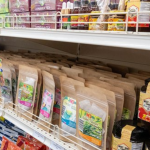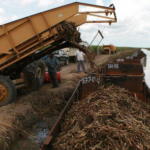The Agriculture Ministry through the Guyana Livestock Development Authority (GLDA) is moving apace with its agenda to provide a sustainable source of food and income for the local population.
Agriculture Minister, Zulfikar Mustapha has disclosed that the ministry has started the distribution of black giant chickens across hinterland communities, specifically Region Nine (Upper Takutu-Upper Essequibo).
The Shulinab Youth Group, in the South Central Rupununi sub-district, has already received 200 of the chicks to expand the Hinterland Environmentally Sustainable Agricultural Development (HESAD) programme.
The village has been actively engaging in sustainable agriculture practices and was recently able to complete a farmland fence project, utilising a grant through the HESAD programme.
Kumu also received a batch of the dual-purpose chickens.
Similarly, persons from St. Ignatius and surrounding communities also received chicks.
The black giant chicken can produce up to 200 eggs annually and about 4.5 kilogrammes of meat. These birds can graze and forage, as well as eat leftovers from the kitchen and still produce reasonably well.
Given these qualities, the bird is well suited for hinterland regions.
The agriculture minister has emphasised that the continued success of these initiatives will contribute to the long-term economic and social development of regions.
He said the undertaking will help to develop valuable skills and knowledge in agriculture and animal husbandry for local agriculturists.
Women in hinterland communities have benefitted from the government’s hinterland programme in 2022, and have been earning much-needed revenue to improve their livelihoods.
About 32,000 black giant chicks were distributed across hinterland communities last year, as the government made a concerted effort to ensure those areas receive the same benefits as coastal communities.
There have been significant investments in poultry production in villages including Pai Pang, Wowetta, Yakarinta and Kumu, to aid in food security and the availability of protein for balanced diets, while earning revenue.
Accordingly, in budget 2023, the ministry will seek to commence direct investments in communities and producer groups starting with four communities in Regions Seven and Eight.
Minister Mustapha said the intervention will allow the government to establish its mechanisms to allow for a wider rollout of this type of intervention.
Meanwhile, the GLDA continues to work along with farmers, associations and other special groups, providing technical support.
Hatchery operators from two Rupununi Livestock Producers’ Associations have undergone training in candling, identifying fertile and infertile eggs, and other techniques.
For clarity, candling detects bloody whites, blood spots, or meat spots, and enables observation of germ development.
The GLDA has received some $491 million in budgetary allocation to advance programmes and projects this year.








